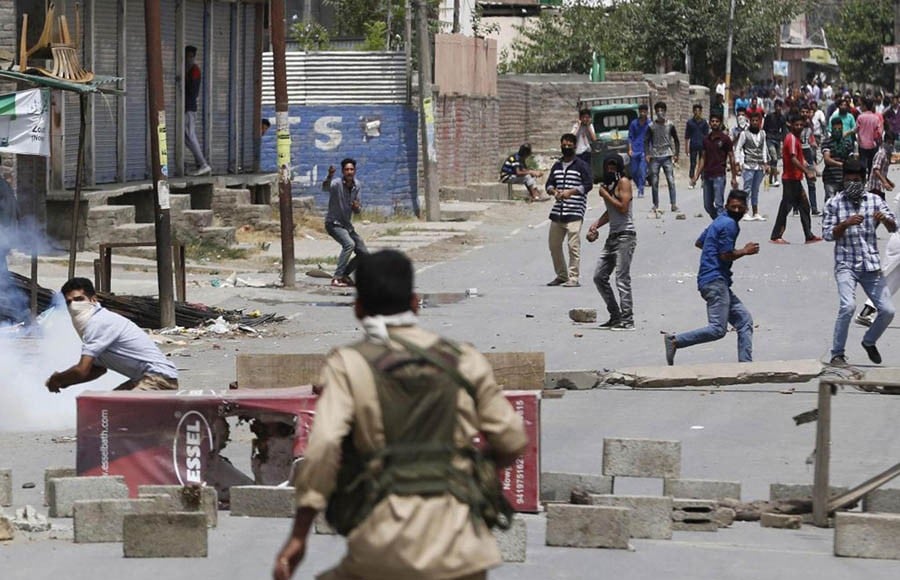
A serious political attempt, not a ban on social media, is imperative to end violence in Indian-held Kashmir

Though Pakistan has rejected the Indian accusations that Pakistan’s army has mutilated the bodies of its two soldiers, India has vowed to take revenge and respond appropriately. This incident came on the heels of a revived wave of violence which has gripped the Kashmir Valley. Reportedly, almost 11 people have lost lives in recent clashes with the Indian security forces.
The State government has imposed a one-month ban on 22 social media sites to restrict communication among the dissidents, particularly young people, who mobilise public against the state highhandedness through Facebook, Twitter and WhatsApp groups.
In recent weeks, a number of videos got viral across the world showing the troops had employed citizens as human shields to protect themselves from the wrath of stone-throwing masses and had also publically beaten up many young people. New York Times, in a recent editorial, aptly commented, "Members of India’s armed forces reached a new low in the long history of alleged human rights abuses in the Jammu and Kashmir when they beat and then tied a 24-year-old shawl weaver named Farooq Ahmad Dar to the front of a jeep, using him as a human shield against stone-throwing crowds."
On the other hand, young people of Kashmir are resorting to militancy due to the lack of space to express dissent and views. The pro-Azadi leadership is either in jail or under house arrest. They are not allowed to run a peaceful campaign to further their political goals. Human rights defenders are also under strict watch. Recently, Khurram Pervaiz, a leading HR activist, was put in prison when he was about to catch a Geneva-bound flight where he was supposed to speak at the United Nations Human Rights Council.
In the last few weeks, six encounters have been reported between militants and forces while authorities have confirmed that many local young people have disappeared to join militant ranks. After a long time, local Kashmiri youngsters have outnumbered the foreign militants. The Indian media has also acknowledged this fact that entire Kashmiri population is alienated and youth and women are infuriated and fearless of dying.
BJP’s ex-external affairs minister, Yashwant Sinha, has stated after a recent visit to the valley that young Kashmiris’ claim that they have lost faith in India because India has failed them. A youngster had told him in Srinagar that "we now celebrate martyrdom". Even female students have joined Valleywide protests and have been fighting against security forces for several days.
It is widely feared in Kashmir that the upcoming summer will be worse than the previous one as New Delhi heavily depends on the military might to administer Kashmir instead of engaging young people and Hurriyat leadership into a constructive dialogue leading to a political settlement of this longstanding problem.
Nowadays, back to back meetings are being conducted in New Delhi and Srinagar to preempt a possible mass uprising in the days ahead. Recently, Mehbooba Mufti, chief minister of Indian-held Jammu and Kashmir, had had a long meeting with Prime Minister Narendra Modi wherein she insisted on starting a fresh round of dialogue with various stakeholders of Kashmir, including All Parties Hurriyat Conference. But, Modi did not budge from his static position.
The Mehbooba government has been fishing in the troubled water as she has failed to prohibit the forces from using pellet guns against protesters last year. She has largely lost her credibility and her political constituency is fast shrinking. The people of Kashmir Valley have demonstrated their apathy towards Mehbooba’s People’s Democratic Party by staying away from polling stations in the recently held by-elections wherein only 7 per cent votes were polled and the PDP’s candidate was defeated by a wide margin.
Despite the worsening situation in Kashmir, the Modi government is not in a mood to initiate a dialogue over Kashmir with Pakistan or even reestablish a connection with the Hurriyat Conference. Pro-India politicians such as Mehbooba Mufti and Omer Abdullah have consistently been pleading for dialogue, but to no avail.
In New Delhi, all the government functionaries like Army Chief General Bipin Rawat and Home Minister Rajnath Singh speak Modi’s language in letter and sprite. The recent election victories, particularly in Uttar Pradesh, have made him the most popular and influential ruler of India. Anti-Pakistan rhetoric, too, paid him well in the elections. Therefore, no one is there who can nudge the Modi government to work for the restoration of normalcy in Kashmir.
The upcoming summer will be more dangerous and chaotic. News about human rights violations and daily clashes emanating from the Kashmir Valley make a huge impact on the socio-political life of Pakistan. Kashmir is gaining more and more space on social media. Additionally, Pakistan has almost entered the election mode and political parties are running election campaigns. Therefore, there is less space to talk wisdom and not play to the gallery.
This is a challenging time for the saner elements in India and Pakistan as they have to play a role to create and facilitate a conducive environment where a serious and result-oriented dialogue can be resumed, leading to resolution of the Kashmir issue. Yashwant Sinha rightly mentions in his report that no amount of money or economic package can resolve the Kashmir dispute. A serious political attempt is imperative to find out a solution keeping in consideration the wishes and aspirations of the Kashmiri people.